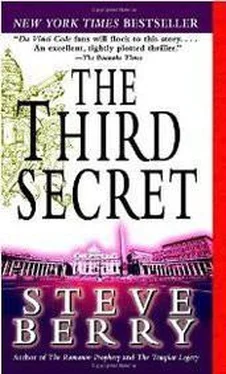“There is no need to explain,” Ambrosi softly said. “It is enough that you say it is so.”
“Your faith is impressive. But you are God’s soldier, and a warrior should know what he is fighting for. So let me tell you what I know.”
They emerged from the car. Ambrosi led the way beneath a velvet sky bleached by a nearly full moon. Fifty meters into the woods, the darkened shadow of a church appeared. As they approached, Valendrea noticed the ancient rosettes and the belfry, the stones no longer individual but fused, seemingly without joints. No light shone from inside.
“Father Tibor,” Valendrea called out in English.
A black form appeared in the doorway. “Who’s there?”
“I am Alberto Cardinal Valendrea. I have come from Rome to speak with you.”
Tibor stepped from the church. “First the papal secretary. Now the secretary of state. Such wonders for a humble priest.”
He couldn’t decide if the tone leaned more toward sarcasm or respect. He extended his hand palm-down, and Tibor knelt before him and kissed the ring he’d worn since the day John Paul II invested him as a cardinal. He was appreciative at the priest’s submissiveness.
“Please, Father, stand. We must talk.”
Tibor came to his feet. “Has my message already made its way to Clement?”
“It has, and the pope is grateful. But I’ve been sent to learn more.”
“Eminence, I’m afraid that I can say no more than I have. It is bad enough that I have violated the oath of silence I made to John XXIII.”
He liked what he was hearing. “So you haven’t spoken of this to anyone before? Not even a confessor?”
“That is correct, Eminence. I’ve told no one what I knew, other than Clement.”
“Did not the papal secretary come here yesterday?”
“He did. But I merely hinted at the truth. He knows nothing. I assume you have seen my written response?”
“I have,” he lied.
“Then you know I said little there, too.”
“What motivated you to craft a reproduction of Sister Lucia’s message?”
“Hard to explain. When I returned from my duties to John that day, I noticed the imprints on the pad. I prayed on the matter and something told me to color the page and reveal the words.”
“Why keep them all those years?”
“I have asked myself the same question. I do not know why, only that I did.”
“And why did you finally decide to make contact with Clement?”
“What has happened with regard to the third secret is not right. The Church has not been honest with its people. Something inside commanded me to speak, an urge I could not ignore.”
Valendrea caught Ambrosi’s gaze momentarily and noticed a slight tip of his head off to the right. That way.
“Let’s walk, Father,” he said, taking Tibor gently by the arm. “Tell me, why do you come to this spot?”
“I was actually wondering, Eminence, how you found me.”
“Your devotion to prayer is well known. My assistant merely asked around and was told of your weekly ritual.”
“This is a sacred place. Catholics have worshiped here for five hundred years. I find it comforting.” Tibor paused. “It’s also because of the Virgin that I come.”
They were walking down a narrow path with Ambrosi leading the way. “Explain, Father.”
“The Madonna told the children at Fatima that there should be a Communion of Reparation on the first Saturday of each month. I come here every week to offer my personal reparation.”
“For what do you pray?”
“That the world will enjoy the peace the Lady predicted.”
“I, too, pray for the same thing. As does the Holy Father.”
The path ended at the edge of a precipice. Before them spread a panorama of mountains and thick forest, all cast in a pale blue-gray glow. Few lights dotted the landscape, though a couple of fires burned in the distance. A halo sprang from the southern horizon, marking the glow of Bucharest forty miles away.
“Such magnificence,” Valendrea said. “A remarkable view.”
“I come here many times after praying,” Tibor said.
He kept his voice low. “Which must help deal with the agony of the orphanage.”
Tibor nodded. “I’ve received much peace here.”
“As you should.”
He gestured to Ambrosi, who produced a long blade. Ambrosi’s arm swung up from behind and slashed once across Tibor’s throat. The priest’s eyes bulged as he choked on the first gush of blood. Ambrosi dropped the knife, gripped Tibor from behind, and tossed the old man out over the edge.
The cleric’s body dissolved into the blackness.
A second later there was an impact, then another, then silence.
Valendrea stood still with Ambrosi beside him. His gaze remained on the gorge below. “There are rocks?” he calmly asked.
“Many, and a fast-moving stream. The body should take a few days to be found.”
“Was it hard to kill him?” He truly wanted to know.
“It had to be done.”
He stared at his dear friend through the dark, then reached up and outlined a cross on the forehead, lips, and heart. “I forgive you, in the name of the Father, the Son, and the Holy Spirit.”
Ambrosi bowed his head in thanks.
“Every religious movement must have martyrs. And we have just borne witness to the Church’s latest.” He knelt on the ground. “Come, join me while I pray for Father Tibor’s soul.”
TWENTY-SIX
CASTLE GANDOLFO
SUNDAY, NOVEMBER 12
12:00 P.M.
Michener stood behind Clement inside the Popemobile as the vehicle motored out of the villa grounds toward town. The specially designed car was a modified Mercedes-Benz station wagon that allowed two people to stand, encased within a transparent cocoon of bulletproof shielding. The vehicle was always used when the pope traveled through large crowds.
Clement had agreed to a Sunday visit. Only about three thousand people lived in the village that abutted the papal compound, but they were extraordinarily devoted to the pontiff and such trips were the pope’s way of saying thanks.
After their discussion yesterday afternoon, Michener had not seen the pope until this morning. Though he innately loved people and enjoyed good conversation, Clement XV was still Jakob Volkner, a solitary man who treasured his privacy. So it was no surprise that Clement had spent last evening alone, praying and reading, then retiring early.
An hour ago Michener had drafted a papal letter instructing one of the Medjugorje seers to memorialize the so-called tenth secret, and Clement had signed the document. Michener still wasn’t looking forward to traveling around Bosnia, and he would just have to hope that the trip was short.
It took only a few minutes to make the drive into town. The village square was packed and the crowd cheered as the papal car inched forward. Clement seemed to come alive at the display and waved back, pointing to faces he recognized, mouthing special greetings.
“It’s good they love their pope,” Clement said quietly in German, his attention still on the crowd, fingers gripped tight around the stainless-steel hand bar.
“You give them no reason not to,” Michener said.
“That should be the goal of all who wear this robe.”
The car looped through the square.
“Ask the driver to stop,” the pope said.
Michener tapped twice on the window. The wagon halted and Clement unlatched the glass-paneled door. He stepped down to the cobblestones and the four security men who ringed the car instantly came alert.
“Do you think this wise?” Michener asked.
Clement looked up. “It is most wise.”
Procedure called for the pope never to leave the vehicle. Though this visit had been arranged only yesterday, with little advance word, enough time had passed for there to be reason for concern.
Читать дальше












